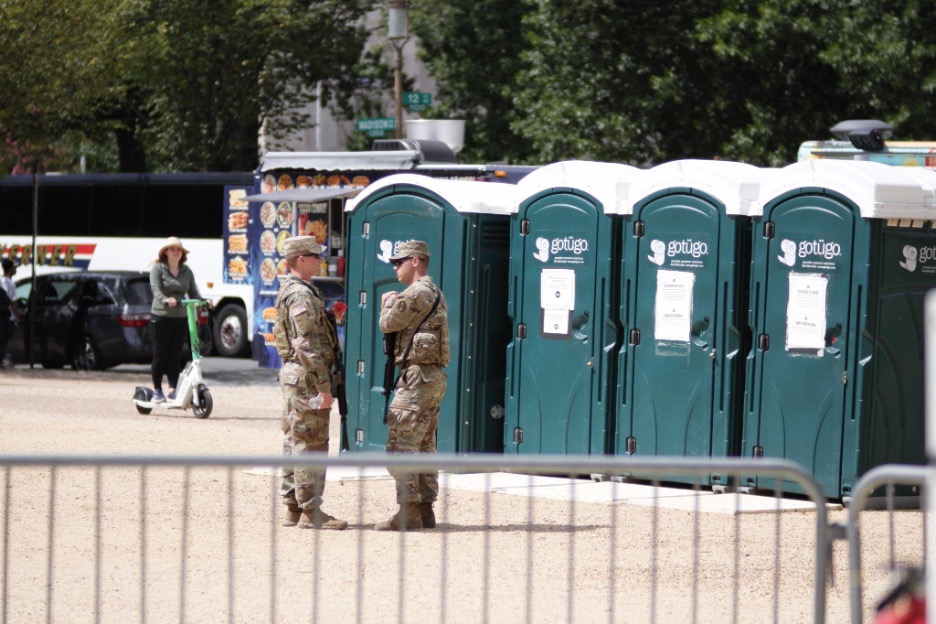Today's Headlines and Commentary
Kim Jong-Un responded to President Trump’s speech to the U.N. General Assembly by calling him a “mentally deranged U.S. dotard” in a statement, and said the North will carry out “hard-line countermeasures.” North Korea’s foreign minister suggested that one response might be to detonate a hydrogen bomb over the Pacific Ocean, the New York Times reported.
Published by The Lawfare Institute
in Cooperation With

Kim Jong-Un responded to President Trump’s speech to the U.N. General Assembly by calling him a “mentally deranged U.S. dotard” in a statement, and said the North will carry out “hard-line countermeasures.” North Korea’s foreign minister suggested that one response might be to detonate a hydrogen bomb over the Pacific Ocean, the New York Times reported. Kim’s threat came in an unusual direct statement, replying to Trump’s threat to “totally destroy” North Korea.
President Trump will announce a replacement for Executive Order 13780, the travel ban, on Sunday, the Journal reported. Sources said that the new measures will use more targeted restrictions to limit travel from a larger set of countries based on their level of cooperation with Department of Homeland Security standards and the threats they pose to the United States. The existing travel ban’s 90-day mandate will expire on Sunday.
Facebook said on Thursday that it would hand over more than 3,000 Russian-linked ads to Congressional investigators, the Times reported. After the Journal reported last week that Facebook had turned over more extensive records of the ads and fake accounts associated with them to Special Counsel Robert Mueller’s investigation, Facebook came under public pressure to more fully cooperate with the House and Senate Intelligence committees also investigating Russia’s interference in the 2016 election. Facebook CEO Mark Zuckerberg said that Facebook had linked the accounts to the Internet Research Agency, a Russian-linked site that promotes conspiracies and hoaxes, according to Politico. He also said there may be additional accounts linked to foreign actors beyond the 470 accounts identified in Facebook’s September 6 statement on the matter. In an early-morning tweet, President Trump called the investigation into Russian interference a “hoax,” the Times reported.
A second period of FBI surveillance of Paul Manafort began after Manafort left the Trump campaign in August and did not involve real-time monitoring of his phone communications, the Journal reported. That reporting contradicted a CNN report from Tuesday that said the Bureau obtained a Foreign Intelligence Surveillance Act (FISA) warrant to wiretap Manafort. The Journal’s reporting instead stated that investigators obtained a FISA warrant only allowing them to access Manafort’s emails and other stored electronic communications. Investigators based the warrant on intelligence reports that Russian officials discussed meetings with members of the Trump campaign.
The Justice Department asked the law firm Skadden Arps to turn over documents related to a report it prepared on behalf of Manafort for the Ukrainian government, the Times reported. The report justified the jailing of one of the chief rivals of Ukraine’s former president. It is unclear whether the request is related to the Special Counsel investigation.
The Special Counsel asked the White House for phone records related to a memo written aboard Air Force One in July that addressed the meeting between Trump campaign aides and a Russian lawyer during the campaign, Politico reported. Mueller also requested documents related to a press briefing on May 3, in which Press Secretary Sean Spicer said the President had confidence in FBI Director James Comey six days before Trump fired him. The requests for the documents focus on internal calls and memos, seeking to establish who knew what and when—key questions related to the possible obstruction of justice.
Iranian President Hassan Rouhani responded to President Trump’s criticism of the Iran nuclear deal and Iran’s missile program by unveiling a new-long range missile, the Times reported. Rouhani said he “would not seek anyone’s permission” to defend Iran. Trump signed a law in August imposing penalties on individuals aiding Iran’s ballistic missile program. Missile are one of the issues of most concern for opponents of the nuclear deal because it lacks restrictions on their development. Separately, Russia condemned U.S. unilateral sanctions on Iran, saying they undermine the collective nature of the six-party Iran deal, according to Reuters.
The Trump administration has proposed relaxing constraints on the use of lethal force in counterterrorism operations outside combat zones, the Times reported. Top officials are preparing to expand the list of possible targets for CIA and military kill missions to include low-level militant foot soldiers. They also are planning on delegating vetting for drone strikes and commando raids directly to the CIA and the Pentagon. The measures reduce restrictions that President Obama imposed in 2013 to limit the scope and collateral damage of such operations.
Turkey will deploy troops within Syria’s Idlib province as part of an accord to create a ‘de-escalation zone’ in northern Syria, Reuters reported on Thursday. The deployment will further implement the zones that Russia, Iran, and Turkey agreed to create to reduce the level of violence in Syria. Russia agreed last week to provide security on the perimeter of the Idlib de-escalation zone, but Turkey will face the difficult task of securing the extremist-dominated province.
Iraq’s armed forces announced an offensive to retake the town of Hawija from the Islamic State, the Journal reported on Thursday. Hawija is one the Islamic State’s last remaining strongholds in Iraq and provides a strategic position to the militants nearby the city of Kirkuk. The Kurdistan Regional Government (KRG) claims Hawija province as part of Kurdistan, but Iraq’s government maintains it should be under Baghdad’s control. The offensive comes at a time of tensions between the KRG and Baghdad as they dispute the status of Kirkuk province in advance of a planned referendum on Kurdish independence on Monday.
ICYMI: Yesterday, on Lawfare
Shannon Togawa Mercer summarized the key issues in the ongoing Brexit negotiations between the U.K. and the EU.
Beverly Milton-Edwards and Alexander Brammer analyzed the perspectives of Iraqi officials in Mosul about the upcoming referendum on Kurdish independence.
Benjamin Wittes posted this week’s Rational Security, The “Age of Flynnocence” Edition.
Email the Roundup Team noteworthy law and security-related articles to include, and follow us on Twitter and Facebook for additional commentary on these issues. Sign up to receive Lawfare in your inbox. Visit our Events Calendar to learn about upcoming national security events, and check out relevant job openings on our Job Board.




-(1).png?sfvrsn=dd820f87_5)
